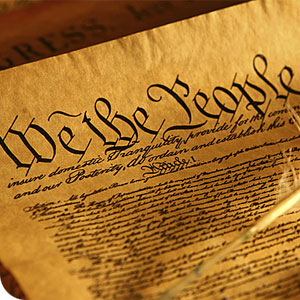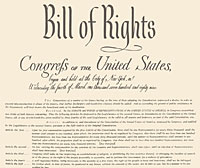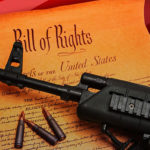
Ever since the tragedy of Sandy Hook, the emotions have been higher than ever when debating gun laws and the second amendment. I understand the emotions on both sides. As a human being, hearing about a horrific story about the senseless murder of 6 adults and 20 children sickens me more than I can describe. On the other side, as a firearms enthusiast and Constitutionalist, I feel terrified that the second amendment may not remain intact.
Here’s the real problem going on in this debate, though – it’s OK to feel emotional about the topic. Emotions can be a healthy thing. But the problem is when we react emotionally and then further act on those emotions.
I’m no psychologist, but I’m pretty sure there aren’t many psychologists who would recommend reacting emotionally to a situation. To the contrary, I’ve heard it many times that putting your emotions in check BEFORE reacting to a situation is much more productive. Think about it. As a husband, if I react emotionally to a situation with my wife do you think that will work out well? As a parent, when your child says something that upsets you is it best for you to act right then, on that emotion? I seem to remember some suggestion about counting to ten to let your emotions calm down before reacting emotionally to your children. Even in sports, how many times have you laughed at the out-of-control coach who reacted emotionally to a bad call? Did that seem like a good idea? In fact, would anyone argue that reacting emotionally is a good thing? Ever?
Yet, that’s what’s happening in our debate about the second amendment. Every time a pro-gun advocate appears on Piers Morgan’s show, he rants on emotionally painting them as insensitive jerks for not feeling bad for those kids in Sandy Hook. How is that a productive debate? Even the president had children at his side when he released his 23 executive actions to curb gun violence. Why did he do that? So he could keep the debate emotional. But I ask again – when has reacting to a situation emotionally ever been recommended as being a good thing?
So, second amendment attackers, I ask you to take a breath. Try to put your emotions aside and let’s debate this with logic, sense and facts – not emotions. Let me ask you first, do you know what the second amendment actually says? If not, read it. After you do, then I ask this: Do you know WHY the second amendment was written? If not, I urge you to research it – objectively. I will tell you that it wasn’t written about hunting and it wasn’t about target shooting. It was about much more.
I could go on for pages about why I believe the second amendment was written, what the second amendment meant to our forefathers and what relevance I believe it has in America today. But I’m not going to do that. Not in this article anyway. Why? Because I’d prefer you read it from those who defend our freedoms everyday.
The following letter was signed by over 1,000 special forces soldiers who are serving or have served in the U.S. Military. I urge you to take 15. 20 minutes to read what they have to say about the second amendment. Why they believe the second amendment is important and why it should be important to you to keep the second amendment intact as our forefathers intended. Please, read it below without your emotions driving you and without any preconceptions you might have. Read and it objectively and then decide logically, not emotionally, whether or not you still want to see the second amendment go away.
Protecting the Second Amendment – Why all Americans Should Be Concerned
We are current or former Army Reserve, National Guard, and active duty US Army Special Forces soldiers (Green Berets). We have all taken an oath to “…support and defend the Constitution of the United States against all enemies foreign and domestic; that I will bear true faith and allegiance to the same.…” The Constitution of the United States is without a doubt the single greatest document in the history of mankind, codifying the fundamental principle of governmental power and authority being derived from and granted through the consent of the governed. Our Constitution established a system of governance that preserves, protects, and holds sacrosanct the individual rights and primacy of the governed as well as providing for the explicit protection of the governed from governmental tyranny and/or oppression. We have witnessed the insidious and iniquitous effects of tyranny and oppression on people all over the world. We and our forebears have embodied and personified our organizational motto, De Oppresso Liber [To Free the Oppressed], for more than a half century as we have fought, shed blood, and died in the pursuit of freedom for the oppressed.
Like you, we are also loving and caring fathers and grandfathers. Like you, we have been stunned, horrified, and angered by the tragedies of Columbine, Virginia Tech, Aurora, Fort Hood, and Sandy Hook; and like you, we are searching for solutions to the problem of gun-related crimes in our society. Many of us are educators in our second careers and have a special interest to find a solution to this problem. However, unlike much of the current vox populi reactions to this tragedy, we offer a different perspective.
First, we need to set the record straight on a few things. The current debate is over so-called “assault weapons” and high capacity magazines. The terms “assault weapon” and “assault rifle” are often confused. According to Bruce H. Kobayashi and Joseph E. Olson, writing in the Stanford Law and Policy Review, “Prior to 1989, the term ‘assault weapon’ did not exist in the lexicon of firearms. It is a political term [underline added for emphasis], developed by anti-gun publicists to expand the category of assault rifles.”
The M4A1 carbine is a U.S. military service rifle – it is an assault rifle. The AR-15 is not an assault rifle. The “AR” in its name does not stand for “Assault Rifle” – it is the designation from the first two letters of the manufacturer’s name – ArmaLite Corporation. The AR-15 is designed so that it cosmetically looks like the M4A1 carbine assault rifle, but it is impossible to configure the AR-15 to be a fully automatic assault rifle. It is a single shot semi-automatic rifle that can fire between 45 and 60 rounds per minute depending on the skill of the operator. The M4A1 can fire up to 950 rounds per minute. In 1986, the federal government banned the import or manufacture of new fully automatic firearms for sale to civilians. Therefore, the sale of assault rifles are already banned or heavily restricted!
The second part of the current debate is over “high capacity magazines” capable of holding more than 10 rounds in the magazine. As experts in military weapons of all types, it is our considered opinion that reducing magazine capacity from 30 rounds to 10 rounds will only require an additional 6 -8 seconds to change two empty 10 round magazines with full magazines. Would an increase of 6 –8 seconds make any real difference to the outcome in a mass shooting incident? In our opinion it would not. Outlawing such “high capacity magazines” would, however, outlaw a class of firearms that are “in common use”. As such this would be in contravention to the opinion expressed by the U.S. Supreme Court recent decisions.
Moreover, when the Federal Assault Weapons Ban became law in 1994, manufacturers began retooling to produce firearms and magazines that were compliant. One of those ban-compliant firearms was the Hi-Point 995, which was sold with ten-round magazines. In 1999, five years into the Federal Assault Weapons Ban, the Columbine High School massacre occurred. One of the perpetrators, Eric Harris, was armed with a Hi-Point 995. Undeterred by the ten-round capacity of his magazines, Harris simply brought more of them: thirteen magazines would be found in the massacre’s aftermath. Harris fired 96 rounds before killing himself.
Now that we have those facts straight, in our opinion, it is too easy to conclude that the problem is guns and that the solution to the problem is more and stricter gun control laws. For politicians, it is politically expedient to take that position and pass more gun control laws and then claim to constituents that they have done the right thing in the interest of protecting our children. Who can argue with that? Of course we all want to find a solution. But, is the problem really guns? Would increasing gun regulation solve the problem? Did we outlaw cars to combat drunk driving?
What can we learn from experiences with this issue elsewhere? We cite the experience in Great Britain. Despite the absence of a “gun culture”, Great Britain, with one-fifth the population of the U.S., has experienced mass shootings that are eerily similar to those we have experienced in recent years. In 1987 a lone gunman killed 18 people in Hungerford. What followed was the Firearms Act of 1988 making registration mandatory and banning semi-automatic guns and pump-action shotguns. Despite this ban, on March 13, 1996 a disturbed 43-year old former scout leader, Thomas Hamilton, murdered 16 school children aged five and six and a teacher at a primary school in Dunblane, Scotland. Within a year and a half the Firearms Act was amended to ban all private ownership of hand guns. After both shootings there were amnesty periods resulting in the surrender of thousands of firearms and ammunition. Despite having the toughest gun control laws in the world, gun related crimes increased in 2003 by 35% over the previous year with firearms used in 9,974 recorded crimes in the preceding 12 months. Gun related homicides were up 32% over the same period. Overall, gun related crime had increased 65% since the Dunblane massacre and implementation of the toughest gun control laws in the developed world.
In contrast, in 2009 (5 years after the Federal Assault Weapons Ban expired) total firearm related homicides in the U.S. declined by 9% from the 2005 high (Source: “FBI Uniform Crime Reporting Master File, Table 310, Murder Victims – Circumstances and Weapons Used or Cause of Death: 2000-2009”).
Are there unintended consequences to stricter gun control laws and the politically expedient path that we have started down?
In a recent op-ed piece in the San Francisco Chronicle, Brett Joshpe stated that “Gun advocates will be hard-pressed to explain why the average American citizen needs an assault weapon with a high-capacity magazine other than for recreational purposes.”We agree with Kevin D. Williamson (National Review Online, December 28, 2012): “The problem with this argument is that there is no legitimate exception to the Second Amendment right that excludes military-style weapons, because military-style weapons are precisely what the Second Amendment guarantees our right to keep and bear.”
“The purpose of the Second Amendment is to secure our ability to oppose enemies foreign and domestic, a guarantee against disorder and tyranny. Consider the words of Supreme Court Justice Joseph Story”: ‘The importance of this article will scarcely be doubted by any persons, who have duly reflected upon the subject. The militia is the natural defense of a free country against sudden foreign invasions, domestic insurrections, and domestic usurpations of power by rulers. It is against sound policy for a free people to keep up large military establishments and standing armies in time of peace, both from the enormous expenses, with which they are attended, and the facile means, which they afford to ambitious and unprincipled rulers, to subvert the government, or trample upon the rights of the people. The right of the citizens to keep and bear arms has justly been considered, as the palladium of the liberties of a republic; since it offers a strong moral check against the usurpation and arbitrary power of rulers; and will generally, even if these are successful in the first instance, enable the people to resist and triumph over them.’
The Second Amendment has been ruled to specifically extend to firearms “in common use” by the military by the U.S. Supreme Court ruling in U.S. v Miller (1939). In Printz v U.S. (1997) Justice Thomas wrote: “In Miller we determined that the Second Amendment did not guarantee a citizen’s right to possess a sawed-off shot gun because that weapon had not been shown to be “ordinary military equipment” that could “could contribute to the common defense”.
A citizen’s right to keep and bear arms for personal defense unconnected with service in a militia has been reaffirmed in the U.S. Supreme Court decision (District of Columbia, et al. v Heller, 2008). The Court Justice Scalia wrote in the majority opinion: “The Second Amendment protects an individual right to possess a firearm unconnected with service in a militia, and to use that arm for traditionally lawful purposes, such as self-defense within the home.“. Justice Scalia went on to define a militia as “… comprised all males physically capable of acting in concert for the common defense ….” “The Anti-Federalists feared that the Federal Government would disarm the people in order to disable this citizens’ militia, enabling a politicized standing army or a select militia to rule. The response was to deny Congress power to abridge the ancient right of individuals to keep and bear arms, so that the ideal of a citizens’ militia would be preserved.” he explained.
On September 13, 1994, the Federal Assault Weapons Ban went into effect. A Washington Post editorial published two days later was candid about the ban’s real purpose:“[N]o one should have any illusions about what was accomplished [by the ban]. Assault weapons play a part in only a small percentage of crime. The provision is mainly symbolic; its virtue will be if it turns out to be, as hoped, a stepping stone to broader gun control.”
In a challenge to the authority of the Federal government to require State and Local Law Enforcement to enforce Federal Law (Printz v United States) the U.S. Supreme Court rendered a decision in 1997. For the majority opinion Justice Scalia wrote: “…. this Court never has sanctioned explicitly a federal command to the States to promulgate and enforce laws and regulations When we were at last confronted squarely with a federal statute that unambiguously required the States to enact or administer a federal regulatory program, our decision should have come as no surprise….. It is an essential attribute of the States’ retained sovereignty that they remain independent and autonomous within their proper sphere of authority.”
So why should non-gun owners, a majority of Americans, care about maintaining the 2nd Amendment right for citizens to bear arms of any kind? The answer is “The Battle of Athens, TN”. The Cantrell family
had controlled the economy and politics of McMinn County, Tennessee since the 1930s. Paul Cantrell had been Sheriff from 1936 -1940 and in 1942 was elected to the State Senate. His chief deputy, Paul Mansfield, was subsequently elected to two terms as Sheriff. In 1946 returning WWII veterans put up a popular candidate for Sheriff. On August 1 Sheriff Mansfield and 200 “deputies” stormed the post office polling place to take control of the ballot boxes wounding an objecting observer in the process. The veterans bearing military style weapons, laid siege to the Sheriff’s office demanding return of the ballot boxes for public counting of the votes as prescribed in Tennessee law. After exchange of gun fire and blowing open the locked doors, the veterans secured the ballot boxes thereby protecting the integrity of the election. And this is precisely why all Americans should be concerned about protecting all of our right to keep and bear arms as guaranteed by the Second Amendment!
Throughout history, disarming the populace has always preceded tyrants’ accession of power. Hitler, Stalin, and Mao all disarmed their citizens prior to installing their murderous regimes. At the beginning of our own nation’s revolution, one of the first moves made by the British government was an attempt to disarm our citizens. When our Founding Fathers ensured that the 2nd Amendment was made a part of our Constitution, they were not just wasting ink. They were acting to ensure our present security was never forcibly endangered by tyrants, foreign or domestic.
If there is a staggering legal precedent to protect our 2nd Amendment right to keep and bear arms and if stricter gun control laws are not likely to reduce gun related crime, why are we having this debate? Other than making us and our elected representatives feel better because we think that we are doing something to protect our children, these actions will have no effect and will only provide us with a false sense of security.
So, what do we believe will be effective? First, it is important that we recognize that this is not a gun control problem; it is a complex sociological problem. No single course of action will solve the problem. Therefore, it is our recommendation that a series of diverse steps be undertaken, the implementation of which will require patience and diligence to realize an effect. These are as follows:
1. First and foremost we support our Second Amendment right in that “A well regulated militia being necessary to the security of a free state, the right of the people to keep and bear arms shall not be infringed”.
2. We support State and Local School Boards in their efforts to establish security protocols in whatever manner and form that they deem necessary and adequate. One of the great strengths of our Republic is that State and Local governments can be creative in solving problems. Things that work can be shared. Our point is that no one knows what will work and there is no one single solution, so let’s allow the State and Local governments with the input of the citizens to make the decisions. Most recently the Cleburne Independent School District will become the first district in North Texas to consider allowing some teachers to carry concealed guns. We do not opine as to the appropriateness of this decision, but we do support their right to make this decision for themselves.
3. We recommend that Assisted Outpatient Treatment (AOT) laws be passed in every State. AOT is formerly known as Involuntary Outpatient Commitment (IOC) and allows the courts to order certain individuals with mental disorders to comply with treatment while living in the community. In each of the mass shooting incidents the perpetrator was mentally unstable. We also believe that people who have been adjudicated as incompetent should be simultaneously examined to determine whether they should be allowed the right to retain/purchase firearms.
4. We support the return of firearm safety programs to schools along the lines of the successful “Eddie the Eagle” program, which can be taught in schools by Peace Officers or other trained professionals.
5. Recent social psychology research clearly indicates that there is a direct relationship between gratuitously violent movies/video games and desensitization to real violence and increased aggressive behavior particularly in children and young adults (See Nicholas L. Carnagey, et al. 2007. “The effect of video game violence on physiological desensitization to real-life violence” and the references therein. Journal of Experimental Social Psychology 43:489-496). Therefore, we strongly recommend that gratuitous violence in movies and video games be discouraged. War and war-like behavior should not be glorified. Hollywood and video game producers are exploiting something they know nothing about. General Sherman famously said “War is Hell!” Leave war to the Professionals. War is not a game and should not be “sold” as entertainment to our children.
6. We support repeal of the Gun-Free School Zones Act of 1990. This may sound counter-intuitive, but it obviously isn’t working. It is our opinion that “Gun-Free Zones” anywhere are too tempting of an environment for the mentally disturbed individual to inflict their brand of horror with little fear of interference. While governmental and non-governmental organizations, businesses, and individuals should be free to implement a Gun-Free Zone if they so choose, they should also assume Tort liability for that decision.
7. We believe that border states should take responsibility for implementation of border control laws to prevent illegal shipments of firearms and drugs. Drugs have been illegal in this country for a long, long time yet the Federal Government manages to seize only an estimated 10% of this contraband at our borders. Given this dismal performance record that is misguided and inept (“Fast and Furious”), we believe that border States will be far more competent at this mission.
8. This is our country, these are our rights. We believe that it is time that we take personal responsibility for our choices and actions rather than abdicate that responsibility to someone else under the illusion that we have done something that will make us all safer. We have a responsibility to stand by our principles and act in accordance with them. Our children are watching and they will follow the example we set.
The undersigned Quiet Professionals hereby humbly stand ever present, ever ready, and ever vigilant.
Originally posted at professionalsoldiers.com







Leave a Reply